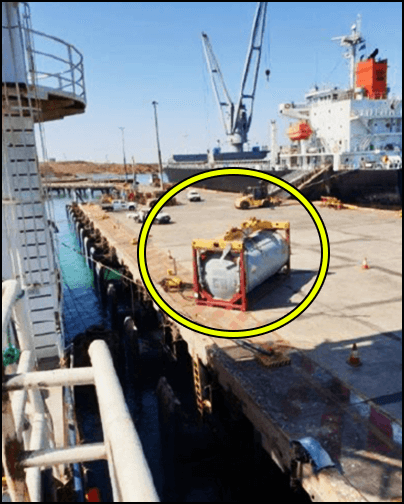-
What happened?
A standard lifting operation was being carried out with a storage vessel and lifting frame.
The storage vessel weighed 24.5te – 36% of the crane’s maximum capacity.
The wire hoist rope failed.
The load, main block and length of wire dropped 3m (9 feet) to the wharf.
No workers were injured.

-
Why did it happen?
There was localised internal corrosion of the wire hoist rope which was undetected.
The wire hoist rope failed by a ductile overload mechanism following the corrosion damage.
The lack of protective zinc galvanised coating on the wire hoist rope was a contributor to the eventual failure.
The maintenance of the wire hoist rope was consistent with standard guidelines.

-
What did they learn?
Reliance on industry guidelines alone when maintaining, testing and inspecting wire hoist ropes may not be sufficient. Frequency of use, intended loads, environmental conditions, time in service, and criticality of the wire hoist rope should also be considered.
Update inspection and maintenance regimes to include manufacturer guidance and a competent person’s assessment of the risks.
Establish criteria to determine when and how magnetic wire rope (MRT) testing should be applied (frequency, triggers, length of wire).

-
Ask yourself or your crew
Have you ever known a wire hoist rope to fail during use? What happened?
What is the preventative maintenance regime for wire hoist rope that we use? Would it have detected internal corrosion?
How often is your equipment inspected for hidden hazards (e.g. internal corrosion)?
Is there anything else we can do to prevent or mitigate this type of event happening here?

Add to homescreen
Content name
Select existing category:
Content name
New collection
Edit collection
What happened?
A standard lifting operation was being carried out with a storage vessel and lifting frame.
The storage vessel weighed 24.5te – 36% of the crane’s maximum capacity.
The wire hoist rope failed.
The load, main block and length of wire dropped 3m (9 feet) to the wharf.
No workers were injured.

Why did it happen?
There was localised internal corrosion of the wire hoist rope which was undetected.
The wire hoist rope failed by a ductile overload mechanism following the corrosion damage.
The lack of protective zinc galvanised coating on the wire hoist rope was a contributor to the eventual failure.
The maintenance of the wire hoist rope was consistent with standard guidelines.
What did they learn?
Reliance on industry guidelines alone when maintaining, testing and inspecting wire hoist ropes may not be sufficient. Frequency of use, intended loads, environmental conditions, time in service, and criticality of the wire hoist rope should also be considered.
Update inspection and maintenance regimes to include manufacturer guidance and a competent person’s assessment of the risks.
Establish criteria to determine when and how magnetic wire rope (MRT) testing should be applied (frequency, triggers, length of wire).
Ask yourself or your crew
Have you ever known a wire hoist rope to fail during use? What happened?
What is the preventative maintenance regime for wire hoist rope that we use? Would it have detected internal corrosion?
How often is your equipment inspected for hidden hazards (e.g. internal corrosion)?
Is there anything else we can do to prevent or mitigate this type of event happening here?
A lifting operation was being carried out with a storage vessel and lifting frame. The wire hoist rope failed, so the load, main block and length of wire fell to the wharf.











